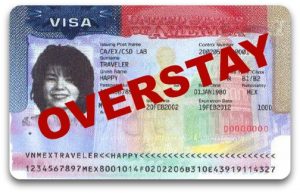
Coronavirus Update: US Citizenship and Immigration Services (USCIS) have made a set of guidelines for those effected by the pandemic and stuck in the US. For more complex cases, it may be worthwhile consulting with a immigration lawyer, who should be able to give more detailed advice.
Our immigration lawyers at Niren and Associates get questions about overstaying a visa very often. Overstaying authorized period of staying in the US is no longer overlooked but instead, taken very serious that can lead to severe consequences. If you overstayed a US visa you may relate to the question below:
Question About Overstaying a US Visa
Q: I came to USA in 2001 on a B1/B2 visa along with my wife and son. My second son was born in the USA in 2003. I had applied for Canada Permanent Residence and we all came to Canada by car in May 2009. I overstayed my visa in the USA. Now, all of my business and my house is still in the US. Is there any way for me to go back to US? I had 5 years multiple visa issued in 1997, in Delhi India. Will the US Consulate have a record of my overstay in the US? If I will apply for B1/B2 again from Vancouver on my new passport, will it be a problem?
A: Without knowing how long you overstayed your status in the US, it is difficult to know what your rights are in terms of returning to the US. Generally, if you overstayed in the US for 180 days or more, you are are subject to an automatic 3 year bar. If you subsequently apply for a US Visitor Visa (B-1/B-2), you have to disclose on the application form your overstay in the US. If you fail to do so, you could be charged with misrepresentation and be subject to a 5 year bar or more. However, there is hope! If you are subject to an overstay bar, you can still apply for a Waiver of inadmissibility to the US and be admitted despite your overstay in the US. The US Waiver process would delay your US Visa application but it is often the solution for applicants with prior immigration violations. More info on Overstaying on your US Visa.
Consequences of Overstaying a Visa in the US
Overstaying a visa in the US can result in severe consequences that could hinder any further traveling plans. Below are some of the consequences of overstaying a US visa:
- Visa overstays may be restricted from applying for Extension of Stay or Change of Status.
- Visa overstays may be barred from returning to the U.S. for ten years or three years depending on the period of overstay or “unlawful presence”.
- Visa overstays may not be able to Adjust Status in the U.S. even if otherwise eligible.
- Visa overstays will have their existing visa automatically revoked or cancelled.
- Visa overstays are generally unable to obtain a new visa except in their country of nationality.
How to Return to the US After Overstaying a US Visa
There is an unlawful presence waiver that will allow you back into the country without having to face the 3 or 10 year bar. In order to be eligible to file for the I-601 waiver, you must have a Lawful Permanent Resident or US Citizen spouse or parent who will face extreme hardship if you are not allowed back into the country.
Why Legal Help for Overstaying Your Visa is Important
Overstaying a visa can have serious repercussions, which can be mitigated with legal help. Without the assistance of a legal expert, an individual with an expired visa can face consequences that may have been avoidable. Time is of the essence, and the process for attaining a waiver is crucial. Don”t hesitate to get the legal help you need.
Why Hire Us to Help You When You’ve Overstayed Your Visa?
While it may be tempting to just do nothing if you are an overstay in the U.S., this is not recommended. A life of “looking over your shoulder” is not a secure way to live. For overstay cases, there is a high risk you can be caught by the U.S. Immigration Authorities and deported. But if you consult with an experience lawyer that handles these matters, there may be viable options for you.
Have a Question related to your Immigration Needs?
Click here to fill out the FREE Immigration Assessment form below and get a response within 24 hours to see if you’re eligible.
The assessment form should take approximately 5-7 minutes to complete. We will get back to you within one business day to let you know if we are able to help.






